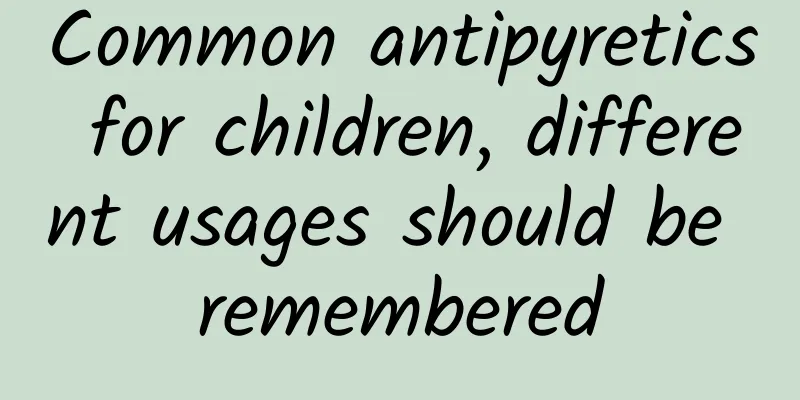Common antipyretics for children, different usages should be remembered

|
Children are not smaller versions of adults. They have underdeveloped organs, immature enzyme systems, poor regulation of body fluid and electrolyte metabolism, and great individual differences in drug reactions. Improper medication can often lead to serious adverse consequences. Therefore, the safe and rational use of drugs in children should be given sufficient attention. At present, the phenomenon of irrational medication for children is very common and has been listed as one of the top ten misunderstandings about medication. It is not only related to the physiological factors of children themselves, but also to other comprehensive factors, such as the shortage of children's special medicines, lack of information on children's medication, and drug abuse. In particular, parents' education level on medication safety is not enough, resulting in blind medication, improper medication, abuse of health products, and irrational use of antipyretic analgesics and traditional Chinese medicine. Fever is the most common symptom in children. There are still some problems about how to use antipyretic analgesics when fever occurs, such as when to use antipyretic analgesics in children with fever, how to use them correctly, how to use them in certain disease states, and the adverse reactions and treatment of antipyretic analgesics. Let us learn more about them below. 1. Understand the basic principles of using antipyretic drugs for children 1. Antipyretics can be used for children over 2 months old, but antipyretics and analgesics are prohibited for infants under 2 months old and newborns. 2. Antipyretics can be used when the child's temperature is greater than or equal to 38.2 degrees Celsius and is accompanied by obvious discomfort 3. When the fever is high, it is recommended to use acetaminophen or ibuprofen. Other drugs such as metamizole, acetylsalicylic acid, phenylbutazone, indomethacin, aspirin, nimesulide, aminopyrine, etc. are not recommended as antipyretics for children. 4. Oppose the use of glucocorticoids as antipyretics for reducing fever in children. 5. It is not recommended to use acetaminophen and ibuprofen together or alternately 6. It is not recommended to use antipyretic analgesics together with compound cold medicines containing antipyretic analgesics. 2. Understand the characteristics and recommended usage of acetaminophen 1.Body temperature drop time: 1-2 hours Effective time: within 1 hour Peak time: 3-4 hours Duration of action: 4-6 hours 2. Applicable age: 2 months and above 3. Administration route: oral, suppository 4. Maximum dose per time: 600 mg or 15 mg/(kg/time), whichever is lower. 5. Maximum daily dose: 2.0 g or 60 mg/(kg.d) for children under 2 years old, 75 mg/(kg.d) for children 2-12 years old, whichever is lower. 6. Adverse reactions: Under conventional doses, adverse reactions are rarely caused, and skin rash, urticaria, drug fever and granulocytopenia are occasionally seen; however, long-term and large-scale use of the drug can lead to abnormal liver and kidney function, and even acute liver failure. In addition, acetaminophen may cause rare and severe skin reactions, including fatal Stevens-Johnson syndrome, toxic epidermal necrolysis, etc. 7. Treatment measures: If serious adverse reactions occur, the drug should be discontinued and symptomatic treatment should be given; if acute poisoning occurs, acetylcysteine should be given for rescue and appropriate treatment should be given according to the condition. 3. Understand the characteristics and recommended usage of ibuprofen: 1. Temperature drop time: 1-2 hours Onset time: less than 1 hour Peak time: 3-4 hours Duration of action: 6-8 hours 2. Applicable age: 6 months and above 3. Administration route: oral, suppository, intravenous 4. Maximum dose per time: 400 mg or 10 mg/(kg.time), whichever is lower. 5. Maximum daily dose: 2.4 g or 40 mg/(kg.d), whichever is lower 6. Adverse reactions: generally mild gastrointestinal discomfort, occasionally rash, tinnitus, headache, etc., severe cases may cause gastrointestinal bleeding, and there are also reports of ibuprofen causing acute kidney injury. 7. Treatment measures: The drug should be discontinued if serious adverse reactions occur. For example, proton pump inhibitors should be given if gastrointestinal bleeding or ulcers occur. When acute kidney injury occurs, different treatments should be adopted according to the severity of kidney injury. 4. Understand the contraindications of acetaminophen and ibuprofen (1) Ibuprofen can be used when liver function abnormalities are accompanied by fever. (2) Ibuprofen is contraindicated in children with moderate or above renal impairment or renal insufficiency accompanied by fever. Acetaminophen can be used if necessary. (3) Ibuprofen should not be used for antipyretic and analgesic treatment of children with heart failure or heart insufficiency. Acetaminophen can be used when necessary. (4) When children with hemorrhagic diseases have fever, the pros and cons need to be weighed. If necessary, drugs such as acetaminophen that have less effect on coagulation function can be used. (5) Antipyretic and analgesic drugs such as acetaminophen are contraindicated in children with G6PD deficiency. (6) In the acute phase of KD (Kawasaki disease), high-dose aspirin should be used for anti-inflammatory treatment, and no other antipyretic and analgesic drugs are needed. (7) The preventive use of antipyretics after vaccination is not recommended. (8) The use of antipyretics and analgesics is not recommended for the treatment of malignant hyperthermia, central fever, and ectodermal dysplasia after general anesthesia. (9) The use of antipyretic and analgesic drugs in children with malignant tumors requires weighing the pros and cons. (10) Children with asthma should use antipyretics after a comprehensive assessment of their condition. 5. Understand the principles of treatment when antipyretics are ineffective 1. The body temperature usually starts to drop within 30 to 60 minutes after the use of antipyretic drugs. If some children still have high fever, it is not advisable to use antipyretic drugs repeatedly in a short period of time. Generally, an interval of more than 4 hours should be maintained. During this period, the focus should be on finding and treating the cause of the disease, supplemented by appropriate physical cooling measures. 2. Physical cooling measures: Physical cooling methods: applying warm water to the child’s forehead, taking a warm bath, wearing less clothing, using a fever patch, using a fan, lowering the indoor temperature, etc. Every child is the source of happiness for every family and the hope for the development of the motherland. It is the responsibility of every medical worker and even medical students to popularize the knowledge of the rational use of antipyretic drugs for children. I hope every child can stay away from diseases and grow up healthily. References Chen Zhimin (National Clinical Research Center for Child Health and Disease, Children's Hospital Affiliated to Zhejiang University School of Medicine), Du Lizhong (National Clinical Research Center for Child Health and Disease, Children's Hospital Affiliated to Zhejiang University School of Medicine), Fu Zhou (National Clinical Research Center for Child Health and Disease, Children's Hospital Affiliated to Chongqing Medical University), Gao Hengmiao (National Children's Medical Center, Beijing Children's Hospital Affiliated to Capital Medical University), Jiang Fan (Shanghai Children's Medical Center, Shanghai Jiao Tong University School of Medicine), Jiang Yuwu (Peking University First Hospital), Liu Enmei (National Clinical Research Center for Child Health and Disease, Children's Hospital Affiliated to Chongqing Medical University), Liu Gang (National Children's Medical Center, Beijing Children's Hospital Affiliated to Capital Medical University), Liu Hanmin (West China Second Hospital, Sichuan University), Liu Xiaohui (National Children's Medical Center, Beijing Children's Hospital Affiliated to Capital Medical University, National Clinical Research Center for Respiratory Diseases), Mao Meng (West China Second Hospital, Sichuan University), Qin Jiong (Peking University People's Hospital), Ren Xiaoxu (Children's Hospital Affiliated to Capital Institute of Pediatrics), Shen Kun Ling (National Children's Medical Center, Beijing Children's Hospital Affiliated to Capital Medical University, National Clinical Research Center for Respiratory Diseases), Shu Min (West China Second Hospital, Sichuan University), Shu Sainan (Tongji Hospital Affiliated to Tongji Medical College, Huazhong University of Science and Technology), Wan Chaomin (West China Second Hospital, Sichuan University), Wang Xiaoling (National Children's Medical Center, Beijing Children's Hospital Affiliated to Capital Medical University, National Clinical Research Center for Respiratory Diseases), Wu Xiaochuan (Children's Medical Center, Xiangya Second Hospital, Central South University), Xu Baoping (National Children's Medical Center, Beijing Children's Hospital Affiliated to Capital Medical University, National Clinical Research Center for Respiratory Diseases), Yin Ju (National Children's Medical Center, Beijing Children's Hospital Affiliated to Capital Medical University, National Clinical Research Center for Respiratory Diseases), Yu Hui (National Children's Medical Center, Children's Hospital Affiliated to Fudan University), Zhu Zonghan (Beijing Municipal Health Commission). Expert consensus on the rational use of antipyretic and analgesic drugs in the symptomatic treatment of fever in children[J]. Chinese Journal of Practical Pediatrics, 2020, 35(3) |
<<: 1-year-old baby died of poisoning! This thing is in almost every household! Be careful!
>>: Do you know, do you know, a few things about effervescent tablets
Recommend
What foods stimulate uterine contractions?
Pregnant women should not feel unfamiliar with ut...
Female paraurethral gland inflammation
Female paraurethral glanditis is mainly caused by...
How to treat postpartum wind? These remedies are very effective
If you experience symptoms of postpartum wind aft...
Is it normal for my period to come eight days early?
Most women have regular menstruation, but for man...
Can I use Fengyoujing when I am pregnant?
We all know that Fengyoujing is a cooling medicin...
What should I do if I have three miscarriages in one year?
Nowadays, women are very open-minded, and the phe...
How to relieve period pain
It is a very painful process for girls when they ...
Does the uterus need a pillow?
In fact, you need to pay attention to the conditi...
Why do pregnant women's hands peel?
Many pregnant women experience peeling of their h...
eMarketer: Mobile phone penetration in Asia Pacific to increase significantly from 2011 to 2015
The latest data from eMarketer found that the mob...
What kind of wine is champagne? How to hold a champagne glass
Champagne is a classic sparkling white wine. High...
What is the reason for black blood in vaginal discharge?
When it comes to abnormal vaginal discharge, ther...
Vulva itching with red spots picture
If women do not pay attention to proper health ca...
How to build female muscles
Muscles have a great relationship with people'...









